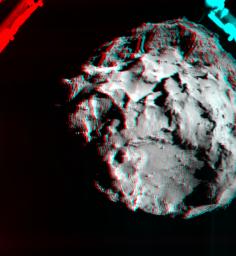A 3D image shows what it would look like to fly over the surface of comet 67P/Churyumov-Gerasimenko. The image was generated by data collected by the Rosetta Lander Imaging System (ROLIS) aboard the European Space Agency's Philae spacecraft during the decent to the spacecraft's initial touchdown on the comet Nov. 12.
The stereographic image was generated using two images acquired by ROLIS when Philae was a little less than two miles (three kilometers) from the surface. The images were taken two minutes apart -- about one hour prior to the spacecraft's initial touchdown on 67P at 8:03 a.m. PST (11:03 a.m. EST). In the image, the landing site Agilkia can be seen immediately below. In the top right of the field of view, one of the landing gear feet can be seen. The resolution is about 10 feet (three meters) per pixel. To appreciate the 3D effect, the image must be viewed with red-blue glasses.
Rosetta is an ESA mission with contributions from its member states and NASA. Rosetta's Philae lander is provided by a consortium led by the German Aerospace Center, Cologne; Max Planck Institute for Solar System Research, Gottingen; French National Space Agency, Paris; and the Italian Space Agency, Rome. ROLIS was developed by the German Aerospace Center's Institute of Planetary Research in Berlin. JPL, a Division of the California Institute of Technology, Pasadena, manages the U.S. contribution of the Rosetta mission for NASA's Science Mission Directorate in Washington. JPL also built the MIRO instrument and hosts its principal investigator, Samuel Gulkis. The Southwest Research Institute (San Antonio and Boulder), developed the Rosetta orbiter's IES and Alice instruments, and hosts their principal investigators, James Burch (IES) and Alan Stern (Alice).
For more information on the U.S. instruments aboard Rosetta, visit http://rosetta.jpl.nasa.gov.
More information about Rosetta is available at http://www.esa.int/rosetta.

 Planetary Data System
Planetary Data System












